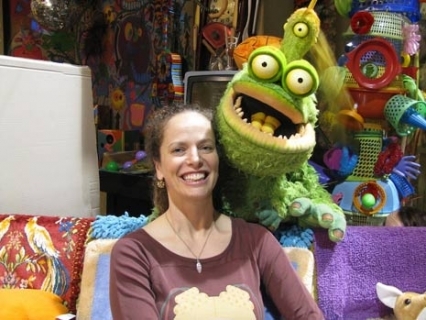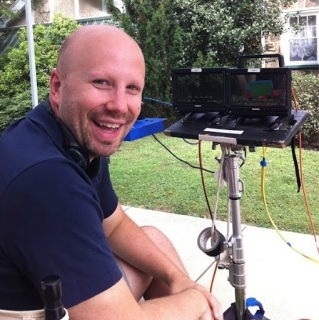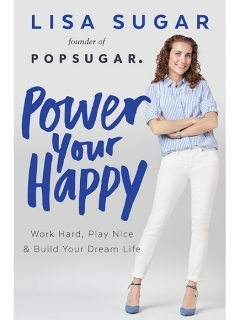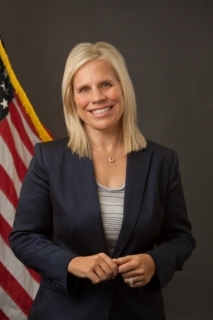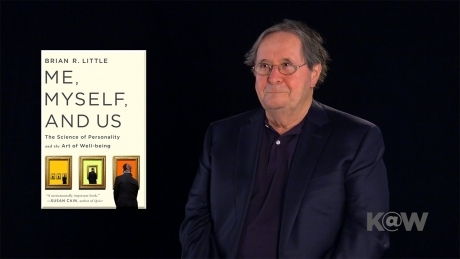Randi Zuckerberg's Blog, page 15
November 23, 2016
Radio Recap: Giving Back

With Thanksgiving less than 24 hours away, I thought I’d bring in two guests who aren’t only giving back this holiday season—they’re inspiring a world of change. My first guest on ‘Dot Complicated with Randi Zuckerberg’ is Komal Minhas, is a writer, investor, and film producer deeply committed to improving the lives of women and girls globally. She’s the producer of Dream, Girl. A documentary about women entrepreneurs made entirely by an all-female crew. Dream, Girl premiered at the White House in early 2016, was named the number one ‘feminist film to watch’ by the Huffington Post, and was listed on Oprah’s SuperSoul 100 list.
My second guest is Katie Prentiss, a documentarian and executive producer with Small Forces, a media company that creates professional videos for non-profit organizations 100% free of charge. The Small Forces team presents a new model of philanthropic giving—using video as a tool to create impact for non-profits, raise funds, recruit volunteers and inspire others into action for change.
“I came across the Dream, Girl Kickstarter campaign about a film for female entrepreneurs. I was so inspired I felt a call to action to invest and support it.”
“We had an all-female crew, which is relatively unheard of in film.”
“We premiered at the White House and that was amazingly transformative.”
“My background was in journalism but I got a full-on education on set.”
“Erin was very intentional about how she created the video for Kickstarter. She new if she could do storytelling the way she’s be called to do it would work.”
“Ava DuVernay said the story is the key to everything.”
“The election has made us more aware of what we need to do.”
“We were on set for about 30 days straight. We rented Airbnbs across Chinatown.”
“It was a learn as you go process. We trusted the women we were interviewing to really tell their story.”
“We had a 40 minute cut and were told we had to go back to the drawing board. We took feedback in stride and created something we’re so proud of.”
“We were told that there was too much going on. We had to braid the stories together.”
“Erin directed and edited the film, which is so hard to do in a feature film.”
“We interviewed 18 men and women for Dream, Girl.”
“We take the audience down a rabbit hole that women don’t get to talk about together.”
“We created something that brings conversations up.”
“We talk about women start 1200 businesses a day. That’s from American Experience. But only 3% of VC funding goes to women.”
“We’re at a precipice at this movement.”
“We’ve been on tour for the past 4 months. We’d like to go to India, Singapore, Australia.”
“To be able to give a voice to women around the world is the greatest point of gratitude I have.”
“Women were literally objects 100 years ago. In this generation and our mother’s generation there has been so much progress. We’re in the early stage of the battle.”
“My biggest dream would be that my great, great, great grandchildren have a more gender appropriate workplace.”
“We socially are not ready for so many of the changes that so many of us are ready for.”
“When I got in touch with Erin back in 2014 I realized we were an independent film to grow an organic audience. It was a space of opportunity.”
“We have community based venues. We have licensing feed for them.”
“I think there’s something about having a friendly relationship with the person who delivers your food to you.”
“Earlier this year when my grandmother passed away we used Facebook Live to see the services. But I don’t know about charging money for the services though.”
“I had always wanted to do video journalism watching Katie Couric growing up.”
“I started to do more documentary work and traveling to do international reporting.”
“I was interning with a production company in Chicago and we ended up spearheading Small Forces.”
“We hope our videos we create for foundations helps them use the video as a tool to create an impact.”
“People, more than ever, feel like they want to do something and what they’re doing is effective.”
“There’s an organization called Kurt’s Café, the chef helps disadvantaged youth by teaching them the food industry and then getting them jobs.”
“I love seeing the outpouring of people donating to large organizations.”
“We are the story finders. Coming from a background of journalism we do a lot of research.”
“We really focus on making sure we have diversity in location, organization and people working on the stories.”
“The Rare and Undiagnosed Network stems from a mother whose 3 children have undiagnosed diseases. She started the network as a support system.”
“Felix’s Famous Cookies was started by an 11 year boy who bakes Mexican cookies and raises money for a different charity and donates it all.”
“We work with organizations to create a different impact plan.”
“Explaining great, creative ideas and showing them can be disconnected. That’s where we come in.”
“We have funding through a private family foundation to put good media in the world. All their conditions are let’s help good people do good things.”
“As a woman in this industry it’s important to me to highlight women and girls.”
“The Viola Project uses Shakespeare to inspire girls. They use all girls in all the roles even Hamlet. They use the text to talk about important things like money.”
“Our first approach is to talk to the people that benefit from the services that we’re highlighting. Their passionate testimony goes so much further.”
“Video is getting so much less experience. You can use your phone but make sure you film horizontally though.”
“We have all of our videos on SmallForces.org but social media is the best to get them out to the most eyeballs and brains.”
Have a wonderful Thanksgiving holiday and don’t forget to tune into Dot Complicated with Randi Zuckerberg every Wednesday at 12pm ET on SiriusXM Business Channel 111!
November 16, 2016
Radio Recap: Growth Advisors & NY Tech Meetups

Research shows that small business owners who utilize growth advisors are more likely to experience a 20% growth rate, which might not sound like a lot on paper, but a 20% growth rate is usually the tipping point where most businesses are able to turn their successes around into major profits. Growth advisors keep businesses focused, provide structure, and deliver guidance to small business owners in need of survival. And for small businesses that receive mentoring, they’ll survive for more than 5 years and have a 70% success rate. That’s double the survival rate of non-mentored small businesses! It’s important for any business to pay attention to numbers like these, especially if success is critical.
The first guest on today’s ‘Dot Complicated with Randi Zuckerberg’ was Tiffani Bova, global customer growth and innovation evangelist at Salesforce, a cloud computing company out of San Francisco.
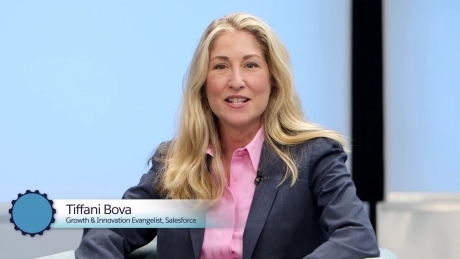 TIFFANI BOVA
TIFFANI BOVA
“Sharing things on social media will follow people around for the rest of their life.”
“At some point we have to have some sort of non-digital in our lives and just enjoy real life.”
“If my FitBit is connected to my scale in my bathroom to my fridge and locks it, then they’ve really created something.”
“How can we use tech to engage new thinking?”
“I call myself a ‘recovering sales rep.’”
“Everything I learned in business I learned at the carnival. My parents owned carnivals and from 15-21 I ran the games.”
“I knew I wanted to get into business I just didn’t know what side. Then I realized I was good at selling stuff.”
“Salesforce has grown exponentially in the past few years. It’s all about customer success.”
“As businesses try to compete and grow, you have to make sure that you have a fantastic customer experience with your brand.”
“I got into cloud computing in 1999 to 2003. We were doing chat to sell at the time, really early.”
“Over the last 16 years tech has advanced so much, customers are so comfortable leveraging tech day to day.”
“This is a time when tech and the customer have almost caught up.”
“I had changed jobs 8 times in 10 years. I realized every decision and job totally prepared me for my career as an analyst.”
“There’s been so much hype around digital marketing and money being spent.”
“There’s a disconnect with the sales rep and the way the customer wants to engage.”
“If you look at a Dropbox or a Gmail it gives you free storage and mail to get you to buy.”
“Everyone’s trying to use experience as a competitive difference.”
“The one thing sales reps can control is their behavior in front of a customer. Their brand is their reputation.”
“Building a brand is built on trust.”
“Prove you’re invested in your customer’s success.”
“I finally had the honest conversation with myself that I’m not an entrepreneur. I have a high respect for them.”
“We’re in the age of distraction. Everything is the shiny thing in the corner.”
“There are only a handful of ways to grow. Your customers are your true growth. Everything else is a distraction.”
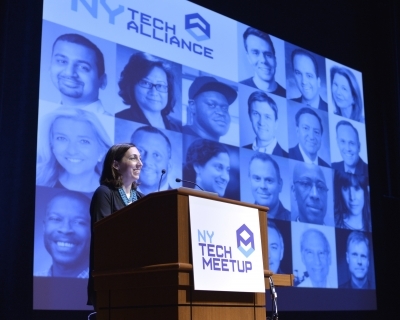 Second guest, Jessica Lawrence Quinn, is the CEO of the NY Tech Alliance—a non-profit organization supporting New York’s growing technology community. With over 60,000 members, the mission of NY Tech Alliance is to represent, inspire, support, and help lead the New York technology community and ecosystem to create a better future for all.
Second guest, Jessica Lawrence Quinn, is the CEO of the NY Tech Alliance—a non-profit organization supporting New York’s growing technology community. With over 60,000 members, the mission of NY Tech Alliance is to represent, inspire, support, and help lead the New York technology community and ecosystem to create a better future for all.
“This was a stumble on job. I had been living and working in SoCal and sold all my stuff and moved to New York.”
“I was looking for events to go to and my friend told me about a New York Tech Meetup. They just became a non-profit and needed an Executive Director.”
“We think of our stage as the launching place for tech startups. It’s a great way to get in front of the press and investors.”
“We only do live demos. It helps the products come alive.”
“The NY tech meetup has been running for 11 years.”
“I really didn’t have much of a tech background and got to know so many members right away.”
“There are 1800 tech related tech meetups in NYC.”
“There are more NY women, especially in Brooklyn, founding tech companies compared to Silicon Valley.”
“There’s an immediate sense of New York pride. We live on top of each other, we intersect, we commute, we see each other physically more.”
“New York is the capital of so many industries. There’s tech and finance, tech and fashion, tech and business.”
“People are thinking about products for the greater good rather than a smaller subset of people who are already privileged.”
“Our Meetup is the largest Meetup in the world. It didn’t happen overnight. It took 11 years.”
“Don’t worry if things go wrong during a demo. We’ve had people live coding during their demo. They are legends now.”
“There’s a general sense at our Meetups that we’re all in it together.”
“It’s a great place to find a job. People have actually got jobs during the demos.”
“Less is more during the demos. Show off the product not talk for 5 minutes.”
“There were so many skills I learned working at the Girl Scouts that apply now. Especially getting more girls involved in STEM and the lack of inclusion for women and people of color.”
“I definitely see more women engaged in tech, women are raising their hands and coming forward. Barely any women were doing demos before. ”
“Almost 100 female run companies applied to demo.”
“Getting more STEM sciences into schools at really early ages helps get girls involved early.”
“There are some concerns in the tech community. We’re civically engaged with innovation and freedom of speech. How can tech create a humane society?”
“Start small. Even if it’s just you hosting a breakfast once a month.”
“I’d really like to see a tech community in NYC that is just as diverse as the people who live here.”
Join ‘Dot Complicated with Randi Zuckerberg’ every Wednesday at 12pm ET/9am PT on SiriusXM Business Channel 111!
November 9, 2016
Radio Recap: 2016 Election Recap
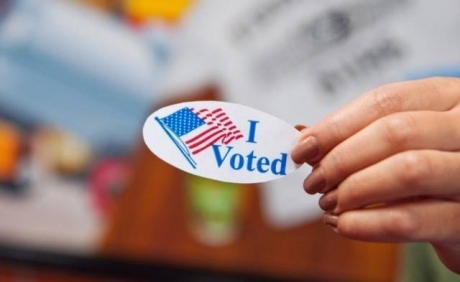
It’s officially over. Yesterday’s historically monumental—and completely nerve wracking—election marks the most divisive election to date. Anyone who remembers going to sleep during the Bush / Gore election of 2000 also remembers waking up under a completely different regime than originally thought— which is completely reminiscent of last night’s events. Now that the election is over and, like it or lump it, Donald Trump is our new Commander in Chief, the question we now must ask one another is what we can do to transform the entire election process from one of negativity and difficulty to one of empathy and ease for the citizens of America?
Joining ‘Dot Complicated with Randi Zuckerberg’ for this election recap were Matt Mahan, CEO of voter-empowerment app Brigade, and Erin Schrode, the youngest candidate ever to run for US Congress.
“My head is still spinning. It was a surprising outcome. But on Brigade we saw incredible enthusiasm for Trump so I’m a little less shocked.”
“Hillary had lower turnout than Obama despite a larger electorate.”
“It’s fascinating that Trump won Wisconsin and Michigan. It reflects the voices outside of mainstream America.”
“We built a platform to help voters understand their democracy. We start from people’s beliefs and choices and ask them to express themselves.”
“Over the last few months we’ve had hundreds of thousands of voters filling out their virtual ballots.”
“In San Francisco we had 60 things on the ballot.”
“On Brigade we noticed disproportionally high support for Trump. A smaller group but more engaged than Bernie Sanders’ camp.”
“Hillary supporters just didn’t turn out the way Trump supporters did.”
“Trump speaks to the white vote, especially in the Rust Belt, who feel they haven’t been heard before.”
“We need to hold this new administration accountable for what happens now.”
“At the end of the Primary season we noticed a pretty big gap in polls. Trump had the highest share rate and enthusiasm.”
“The social bubble is a real thing. There was a lot of real misinformation swimming around.”
“We’ll see action on immigration. We may see a positive reform on the tax code.”
“This race revolved so much on personality that I have no idea what Trump’s policies are.”
“We have a feature called Debates which allows people to publish an opinion and let’s people agree or disagree. It’s a counter trend on other election platforms.”
“We have a community team that steps in and talks to people. We believe in free speech, but there’s a line that a user can cross that will get someone kicked off.”
“One of the things that’s been a failing in our media is a lack of empathy.”
“I think we have to ask ourselves if we’re educating citizens for freedom.”
“Our education system is falling short of 21st Century democracy.”
“There’s only so much we can do to regulate media.”
“We’re able to move billions and trillions of dollars around online. But with voting and recent episodes of hacking the process of voting online is setback.”
“Seeing the level of interest and engagement of the voters was incredibly inspiring.”
“You have a reason to stay involved.”
“I’m struggling to be out of bed right now. The doorman hugged me, the cabbie offered to move me to Haiti.”
“No one thought the trolls were real. We live in a bubble and it’s been popped.”
“Trump was able to reach so many people, the rhetoric of hate is so much easier to rally around than love.”
“At the same time people were afraid to speak about if we really wanted to vote for Trump. It wasn’t socially acceptable.”
“The Clean Air Act, Affordable Health Care Act —bye bye. All of the executive orders Obama worked so hard to get through will go away.”
“There is no counter voice, Trump’s voice is the voice of the land.”
“We have to recognize that this is a fair election and Donald Trump is the President Elect of America.”
“The lack of specifics of what Trump will do. Some of it he’s kept a secret, we don’t know the people involved. His erratic nature is what make me scared.”
“It’s in what Donald Trump has said he’ll do in the first 100 days that frightens me.”
“Children are altering their behaviors because of this scary rhetoric.”
“I think Trump spoke from an unfiltered standpoint. Which spoke for many Americans and what they were thinking.”
“I don’t want to liken my campaign to Donald Trump’s, but I was unfiltered. They could see what made me tick.”
“Hillary focused too much on Trump’s words instead of what she could bring and hope for the country. Only in the last couple of weeks did it shift.”
“There’s too much content out there. We pick influencers that we trust but they’re aligned with our points of views. It’s hard to find an unbiased media source.”
“Discern the facts for yourself. My Twitter I’m very conscious to have people with whom I disagree.”
“I was asked by students what I wanted to see shift, what tech companies could do. I said figure out a way to vote online. That’s my challenge.”
“It’s been an incredible journey. We can make our voice heard through social media, traditional media, with our pen.”
“Stay involved. We need you as much today as we will in 100 days from you. That’s the American Democracy experience.”
Join ‘Dot Complicated with Randi Zuckerberg’ every Wednesday only on SiriusXM Business Channel 111 at 12pm ET/9am PT.
November 2, 2016
Radio Recap: Uncharted Play with Jessica O. Matthews

Imagine that kicking a soccer ball for thirty minutes could generate enough energy to light a lamp for 3 hours or—better yet— imagine you could charge your iPhone’s dying battery by jumping rope for a few minutes. Not only is it possible, it’s already here. Jessica O. Matthews is the CEO and Founder of Uncharted Play, an energy generating play-products company with products on the market like the Soccket, a portable, power-generating soccer ball that President Obama himself has tried out.
Called the “Elon Musk of kinetic energy” by the United States Chief Technology Officer, Jessica Matthews has been named one of Forbes’ 2016 ‘30 Under 30’ and serves as an Ambassador of Entrepreneurship for Nigeria. And today she sat down to discuss how she discovered how to make playtime generate electricity on ‘Dot Complicated with Randi Zuckerberg.’
“My background is in economics. I studied how people think about the world. It’s all perception.”
“Once a company is over 20 people anything can boil down to a people problem.”
“The most mortifying thing in the digital age is sending something you shouldn’t say.”
“What Uncharted Play does special is that we’re really an energy company.”
“Women entrepreneurs qualify what we’re doing because we like to stay in our line.”
“We’re creating baby strollers you can push that charge your phone at the same time.”
“Motion Based Off –Grid Renewable Energy is MORE—it’s what we put inside of everything to harness power.”
“I’ve lived the life of unlikelys. I’m a dual citizen of Nigeria and the US and raised in upstate NY where its main export is Snookie from the Jersey Shore.”
“I’m trying to be a perfect balance between Bill Nye the Science Guy and Beyonce.”
“I got into energy because I have family who don’t know what to do when the sun goes down. In Nigeria the main issue is not having clean energy.”
“Living with a kerosene lamp is like studying under your car or smoking two packs a day. I got sick of that experience in Nigeria.”
“Soccket was a class project that came out of a real experience.”
“How can you take passion and hope and apply it to life?”
“My strategy every single day for the past 9 years is being so grateful for the experience to see what really moved me.”
“We just closed the largest Series A some say a black woman’s ever had in history.”
“When I was growing up I always wanted to be an inventor. I would make weird stink bombs.”
“My sister thought I was crazy until two years ago. Now she’s my director of marketing.”
“My parents are Nigerian immigrants. The only magical ruse they kept up was my believing in the Tooth Fairy. It turned me into someone who believed in science and magic together.”
“If you can give yourself a gel manicure you can start a B2B. I’m sorry, it’s not that hard.”
“Our mission shouldn’t just be to distribute a million balls, it should be to reach a million kids to give them a platform to build on.”
“The next Einstein is going to be someone who hasn’t had a chance to sit at the table yet.”
“We’re working on a program called Uplift One Million with a STEM curriculum to help kids grow.”
“I did a talk with someone who was a speechwriter at the White House. They brought me into the America Invents Act.”
“It’s one thing to invent a product but to scale it is an entirely different process.”
“Both the Soccket and Pulse are made in the US.”
“I wish they emphasized supply chain in 5th grade. Don’t teach me cursive.”
“Supply chain is critical for understanding business.”
“Attempt to see your differences as a competitive advantage.”
“As women we’re bringing a bank of observations and experiences.”
“Be comfortable with being creative of how you get to the next level.”
“Sometimes we can’t drop out of school because our parents would kill us.”
“You’re charging a new path. Be comfortable with mistakes and entering a space where you’re being innovative by getting up each time you fall.”
Make sure to tune into ‘Dot Complicated with Randi Zuckerberg’ next Wednesday, November 9th for an election recap with Brigade! Only on SiriusXM Channel 111 at 12pm ET/9am PT
October 26, 2016
Radio Recap: Corporate Anthropology + Awesome Institute
 Years ago Google hired on its first of many ethnographers to ferret out the meaning of mobile. Intel, too, has an in-house cultural anthropologist, and Microsoft is reportedly the second-largest employer of anthropologists in the world. Today on ‘Dot Complicated with Randi Zuckerberg’ Dr. Andi Simon, corporate anthropologist and author of On the Brink, explained why both giant corporations and small business owners are seeking cultural expertise.
Years ago Google hired on its first of many ethnographers to ferret out the meaning of mobile. Intel, too, has an in-house cultural anthropologist, and Microsoft is reportedly the second-largest employer of anthropologists in the world. Today on ‘Dot Complicated with Randi Zuckerberg’ Dr. Andi Simon, corporate anthropologist and author of On the Brink, explained why both giant corporations and small business owners are seeking cultural expertise.
“The number of businesses going through rapid change are angry at their customers wrongly.”
The brain sees, then decides. We buy with emotion.”
“The way forward is all around you. It’s time to see it.”
“You don’t have to hire an anthropologist, you have to act like one.”
“There’s a place in Scotland where kids were getting obese so they put in a mile long run before school. If you walk your creativity goes up 60%.”
“We weren’t made to be sedentary.”
“You don’t know what things mean until you put them out there.”
“Most people think of anthropology as studying native sciences. But we apply our methods to conflict societies are cultures.”
“If you step out and look as an observer you see what you’ve been ignoring.”
“I’m amazed at the processes and policies that people don’t notice.”
“I was in college when I discovered anthropology. It’s a passion not a job.”
“I took my daughters to Greece when they were 4 and 5 to study Greek women.”
“Studying it versus doing it is a mind opener to understand what you’re really doing.”
“Favorite quote: Henry Ford – If I asked people how to improve transportation they would’ve told me to make horses faster.”
“Don’t outsource. Bring it inside.”
“Undercover Boss is some of my best advertising.”
“Our biggest frustration is people hire us then don’t listen to us.”
“Respect what observation is providing.”
“We get hired to help companies grow.”
“If the way forward is all around you it’s coming right at you.”
“Women in these companies are ripe with innovative ideas.”
“Women prefer a clan, collaborative teamwork culture. Once you understand that you need communication and creativity.”
“Women have to change their voice so people listen and isn’t a mimic of a man’s voice.”
“Change is a journey.
“People thrive because of company culture. Coming to work and knowing what to do.”
“When we council a CEO we try to build in spending a day in the life as a customer or hanging out in the cafeteria and listened to your employees.”
“Have the CEO spend time being a customer. Get them to take a look at emails you delete. Look at keywords on the website.”
“The more ideas you have, the more likely you’ll have good ones.”
“The timeframe for being is good has shrunk.”
“Amazon isn’t a thing, it’s many things experimenting to do many, many more things.”
“You need to be on top of possibilities and build it into innovation.”
“Never say you ‘tried that once.’ You need to try things many times.”
____________________________________________________________________________
Imagine that you can find that ever-allusive work / life balance while, at the same time, become more physically, emotionally, intellectually, and spiritually healthy. Imagine you could create a more fun—yet meaningful and profitable—company. Imagine you could just be more AWESOME—who doesn’t want that, right? At the Awesome Institute entrepreneurs are coached to become happier, more balanced, and more prepared for the next level. And to tell you how it’s done is Andrea Garfield, CEO and coach at the Awesome Institute which helps entrepreneurs enjoy satisfying lives while finding the ideal work / life balance.
“Awesome Institute came from my own experiences. I suffered a lot. I made mistakes and got burned out.”
“I’ve worked with thousands of entrepreneurs everywhere and saw a lot of suffering. I turned my attention to helping others.”
“We look at long and short term goals. Physically, mentally, and emotionally.”
“We help entrepreneurs learn to handle problems themselves.”
“We look at Self, Family, Business and Community.”
“Before every session we have clients rank themselves. It’s a great exercise to see how you’re changing over the weeks.”
“We create development programs to see what you need to do in terms of self care so there’s meaning not guilt.”
“We pull in long term issues to what you’re doing on the day to day.”
“I see a lot of patterns across companies. Taking care of ourselves suffers.
“Being an entrepreneur requires a lot of development. You aren’t the same person 10 years later.”
“Getting healthy is personal for everyone. What fits into their lives and what won’t they dread everyday. It’s not about losing weight.”
“Athletes see great doctors and get massages aside from being physically in shape. The same thing applies to entrepreneurs.”
“We have a lot of female clients. I see more guilt from women being separated from their families.”
“Women are great at relationships and building inclusive cultures.”
“We teach a class on saying ‘no’. When you say no to something you say yes to something else.”
“Spend your time in alignment with your priorities.”
“Reading books on your own is great but having a coach reflect back to you what they see is very helpful.”
“When people are more self aware it helps them change organically on their own time.”
“We work on creating areas of improvement in 6 months increments. It’s not like therapy where you’re supposed to go forever.”
“Be comfortable with the unknown.”
“Being curious never made leadership—or parenting—worse.”
“I don’t work a lot on the weekends or early in the morning because I try to walk the walk that I preach at Awesome.”
“Learning how to take care of yourself and have support are the two best pieces of advice I can give.”
“Entrepreneurship is not something you do alone—contrary to what the media may say.”
Join ‘Dot Complicated with Randi Zuckerberg’ every Wednesday at 12pm ET/9am PT on SiriusXM Business Channel 111 to hear about those making the biggest strides in tech & business!
October 19, 2016
Radio Recap: How We Made DOT!

Turning a children’s book into an animated program is the stuff of dreams. I know because it’s happening to me RIGHT NOW. Shortly after I published my first children’s book, DOT, the Jim Henson Company approached me about creating an animated series based on a little girl who uses technology to help her imagination flourish. I’m happy to announce DOT will be premiering on the Sprout Channel October 22nd. But today on ‘Dot Complicated with Randi Zuckerberg’ I’m with the people who helped make it happen.
Executive Producer of DOT and Executive Vice President of Children’s Entertainment at Jim Henson, Halle Stanford, Director of Original Programming and Development at Sprout and NBCKids, Kristofer Updike, and Line Producer at animation house, Industrial Brothers, , discussed the process of turning a children’s book into an animated series—including what it takes to create DOT!!
“Innovation is important.”
“I always wanted to be involved in children’s TV. It’s a big dream come true.”
“I was in college at USC Film School and studied animation writing and animation.”
“We fell in love with DOT from the front page.”
“DOT is a modern little girl. She’s not in the future. We knew there needed to be a show for the modern child.”
“Children need to see themselves mirrored on TV.”
“At Jim Henson we always say we create preschoolers first friends. We knew DOT was someone we wanted to be friends with.”
“How do we make the idea and message come across in the show. It informs everything—character and story.”
“It’s important for us to include the family. They must be authentic and involved.”
“Bringing together the right team and always delivering the right message is a dream team. Every show has a certain chemistry. DOT has positivity and excitement.”
“Jim Henson loved new technology and the medium of TV when it first came out.”
“DOT reflects what happens in the modern world.”
“It’s a great time to be a gatekeeper and tastemakers of getting stories out there right now.”
“We have to be passionate about what we develop and believe in. We keep an eye o the audience and what they need.”
“You do not have to be a parent to work in children’ TV. People who work with kids are at some stage of arrested development with their own childhood.”
“Put yourself in the shoes of your viewer. Research and walk down the toy aisles. Know your audience.”
“We need innovation but we need checks and balances before they hit the market.”
“I’ve always been in theater and TV since I was little. I’ve performed all over. I believe in making people laugh.”
“Hearing little ones laugh gives me so much joy. It transcends ages.”
“Sprout is NBC/Universal’s preschool TV channel— we’re a fully originals only network.”
“When NBC saw the value in children’s programming they bought out our partners.”
“We’re ready to talk about kids and tech and I think parents are ready to hear it.”
“I used to do things that DOT did in the 80s, the equipment was just a lot bigger.”
“For Sprout, we believe we’re helping kids grow into good people.”
“Technology is a tool to empower a real life connection.”
“We’re entering an age of women. Not just a year—an age.”
“The intersection of girls and tech is what I love about DOT.”
“It’s an amazing time to be in this business. It’s a great time to get your stories seen.”
“Good storytelling is good storytelling whether it’s short form or not. It rises above the platform.”
“Be passionate about what ideas you have. Be open to grow. Look to those around you yet be original. All you need is you.”

“In the startup culture there’s a lot of ‘if you don’t work hard enough and quick enough there’s another company that will beat you.’”
“A line producer is the communication between the executive crew to the artists. I’m involved in every stage from the ground up.”
“We have educators that make sure everything is appropriate for our age of kids we’re creating for.”
“Throughout my childhood I was a writer—particularly puppet-based plays.”
“Toronto is a really great place for children’s TV.”
“A lot of the animation was taken from the DOT itself. There’s so much charm in the book and it’s so unique.”
“Having a balance of tech and retro colors makes the animation look timeless.”
“We use Cell Action to animate DOT. It’s new to North America. But you can see DOT’s hair and skirt move.”
“DOT is the first show in North America to use Cell Action animation.”
“I’ve been in animation for 10 years. I used to be one of 2 or 3 women in the studio. Industrial Brothers is nearly half women.”
“Animation schools are about half women, if not outnumbering them, in Toronto schools.”
“Based on the tech that appears on DOT, the majority of our animation crew are still young so they know what’s going on it that world.”
“Love what you do, it gives you the drive to move forward.”
“Get involved with film festivals, volunteer, introduce yourself.”
Make sure to tune into DOT on October 22nd at 11am ET only on SPROUT!
October 5, 2016
Radio Recap: Content Creation + Marketing New Gadgets
 72% of all marketers have some sort of content strategy in place, yet 70% of marketers lack a consistent, or integrated, content strategy—meaning sure, they have one, but it’s probably not working. What about the remaining 29% of leading marketers? They systematically reuse and repurpose content as content is found to be the most effective when it moves through a full editorial process. That means strategic planning, idea generation, assignment, writing, editing, optimization, publication, and analysis—all created by a highly experienced editorial team. It’s been estimated that by 2017, 51% of companies will have an executive in their organization directly responsible for an overall content marketing strategy. (i.e., Chief Content Officer, VP or director of content).
72% of all marketers have some sort of content strategy in place, yet 70% of marketers lack a consistent, or integrated, content strategy—meaning sure, they have one, but it’s probably not working. What about the remaining 29% of leading marketers? They systematically reuse and repurpose content as content is found to be the most effective when it moves through a full editorial process. That means strategic planning, idea generation, assignment, writing, editing, optimization, publication, and analysis—all created by a highly experienced editorial team. It’s been estimated that by 2017, 51% of companies will have an executive in their organization directly responsible for an overall content marketing strategy. (i.e., Chief Content Officer, VP or director of content).
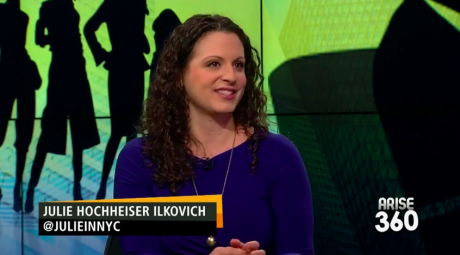 Julie Hochheiser Ilkovich, founder of Masthead Media
Julie Hochheiser Ilkovich, founder of Masthead Media
“If you don’t reach one person online, you need to create a different strategy.”
“I live in NYC and don’t drive a lot which makes texting and driving all the more scary to me.”
“I learned how to run a business and the skill set of creating content.”
“Working at a major corporation is so great for entrepreneurs. You work with all different types of people and take on multiple roles.”
“I got to learn from major media executives and glean their talents and take them to go.”
“Masthead is similar to a content agency. We create quality content for brands.”
“It’s not just writing a blog post and throwing it up. But what are your goals?”
“I don’t think people know why they’re doing content creation sometimes.”
“We work with our clients who know what they want, but sometimes they know they need a blog, but why.”
“We tell everyone they can be an online lifestyle brand. And now is the time for it.”
“Chipotle is a lifestyle brand now!”
“Why are you creating it, what are your goals, who is your audience?”
“The goals of your content are super important. It’s like the goals of your social media. Why do you need to be everywhere? What are you saying?”
“You have to think about your audience. How are you engaging them?”
“It’s not enough to create the content, where’s it going to live?”
“Content is not a brand’s business. Let the experts did it.”
“Frequency is important. It doesn’t have to be as frequent as everyday. When starting out 2x a week is good.”
“You have to post at least every week.”
“Quality is important. Do people want to read this? Make it interesting editorial.”
“Content is not just about marketing. It’s editorial, telling a story but with branded content.”
“Alex and Ani, Red Bull, Lululemon are all really great with their content creation.
“You don’t have to be a B2C brand to create content. It doesn’t have to be flowerly language.”
“If you’re a small company and you want to do content but it’s expensive—start small. Do 2x a week. Ask what editorial outlets are similar to what you want.”
“Ask, what is a publication that has the audience we want to reach?”
“Type in a term to the Google search bar and see what people are finding when they search the same term from the autofill drop down.”
“Minimum of 250 words or it won’t get indexed properly. 250-500 words.”
“Google has gotten so smart. It recognizes good content and good titles.”
“Have a life cycle for your content. Once it goes live, put it in your newsletter and on your social media. Repurpose it.”
“Our writers are mostly people who want to be freelancers and not have full time jobs.”
“We look for experience in different verticals in our writers.”
“It’s helpful if our writers come from journalism but that’s not the only way to learn good writing.”
“You don’t have to come from one place to become a content writer.”
“Start noticing that everyone is creating content. Pay attention to catalogues, soon they’ll be real magazine. Every brand is doing it.”
 Patrick Gevas, Vice President of GreenRoom Agency
Patrick Gevas, Vice President of GreenRoom Agency
GreenRoom Agency is a leading full-service digital marketing and public relations agency working with some of the most innovative brands on the planet.
“We’re looking for products that get us excited. We look for companies that are doing something interesting with an interesting spin.”
“Our roster is now dominating in tech. We also have home and housewares that look for beautiful design.”
“We find a lot of things that are made in America and by local businesses.”
“Miami isn’t normally thought of us a tech hub but we’re expanding tech and talent here.”
“Electric bicycles, the cruise industry, James Beard restaurants all in Miami are really attracting tech talent.”
“There’s a blend of traditional media and social aspects. Everyone’s a journalist.”
“We move the needle for our clients by leveraging our relationships.”
“I’ve seen a few blogs go from not many visitors to hundreds of thousands of visitors a month.”
“Geo-location is really important for both PR and digital. We see a lot of success by focusing on specific research.”
“Strategic messaging is also absolutely critical to get into brick and mortar stores.”
“If you’re going in for a big pitch, geo-locate to that region.”
“Parents are struggling with their teens / tweens screen time. Circle partnered with Disney to allow parents to filer & set limits on gadgets.”
“Dog and Bone from Australia makes super interesting products. Their Smart Padlock is accessible from the app. You can give access to others.”
“NORA absolutely does help to stop snoring. Their whole approach is not wearing something on your face to get relief.”
“Keep your passion. When we hear a passionate founder talking about what they’re doing, it moves us too.”
“The worst thing for the entrepreneur is either they have a copycat or they have a copycat.”
Tune into Dot Complicated with Randi Zuckerberg every Wednesday at 12pm ET/9am PT on SiriusXM Business Radio Channel 111!
September 21, 2016
Radio Recap: From Blog to Business

Imagine you could turn your lifestyle blog into a steady income that eventually allows you to quit your day job. It might be the ultimate dream but there’s no easy path to get there. Out of the estimated 70 million blogs out there today, 95% are abandoned and more than half aren’t bringing in any revenue whatsoever—yet, according to Technorati’s State of the Blogosphere 2015, blogs outrank social networks for consumer influence and opinions. While there are bloggers who work full time and earn extra money on the side, there are also huge success stories, like Julie Powell’s blog that was turned into a book that was made into the movie “Julie and Julia.” Or like Lisa Sugar, founder of PopSugar, who turned her celebrity blog into a lifestyle media brand. Today on ‘Dot Complicated with Randi Zuckerberg’ we discussed what turns a blog into a successful business.
“If you want to test something and share it with the world—power your happy and do it.”
“I was writing in a conversational friendly tone and people loved it. 6 months later I quit my job to go all in.
“We write about everything, fashion, living, parenting. Everything from Game of Thrones to 5 minute workouts—PopSugar runs the gamut.”
“Everything out there was mean and snarky or matter of fact. I wanted to have fun and promote people.”
“The Brad and Angelina news was so big when we started and here it is again.”
“People care a little less about celebrities walking down the street and more about their projects and what they’re doing.”
“We’ve remained what we were from the beginning. It makes people feel good and they want more of it.”
“We follow PopSugar Principals and veer away from click-bait.”
“We have a lot of training and have a basis of what the PopSugar voice is. At the end of the day we know what resonates.”
“There’s such an extensive process to get hired. We do twice a year training and look at words that work, words that need to be retired.”
“We always look at what’s resonating. It’s an ever evolving process.”
“I started the company with our husband and our daughter came the first 3 years. We hired a lot of friends at first and created a fun workplace.”
“I’ve been doing this for 10 years now. I keep getting asked why I did it and how do I sustain it, so I decided to write a book.”
“The best part about it was writing the outline. We met with a lot of different folks who asked questions that helped the outline grow.”
“Writing the book was a lot faster than I thought it would be. Now is the slow part.”
“Power your happy means doing what you love everyday, even if it’s a hobby.”
“Anything outside that powers my happy is spending time with my family.”
“Figure out things you do like at your current job. There were things I loved in advertising but I knew I didn’t want to do it forever.”
“How can you take a small step in another direction and get to where you want to be?”
“You can always take life skills away from different jobs. I asked to be involved in inventory folding jeans at Urban Outfitters.”
“I’m constantly inspired by Beyonce who controls her image but is totally relatable.”
“Power Your Happy is the story of PopSugar and how to figure out what you want to do for the rest of your life.”
“Starting small is really important. Create an online persona first and build up a personality people gravitate towards.”
“When you build your audience you have a focus group that you can learn off of.”
“Being able to showcase your energy and experience will make people gravitate to you.”
“Find something that makes you interested.”
“Connecting can range in so many different things. You can connect people in special ways.”
“Know your target audience and how to find them.”
“We’ve always been a very brand-friendly site. Companies feel safe working with us.”
“When we got married I never thought I’d work with my husband. We do different parts of the business but it’s great when we’re together.”
“The hardest thing is deciding what’s for dinner at night. We’ve made so many decisions during the day.”
“There are times when the only conversation my husband and I have together are through text.”
“Consistency is important. People need to know new content is coming regularly otherwise an investor is not going to invest.”
“What point of view are you bringing and what sort of stuff are you bringing that’s new from what’s out there?”
“We launched our career and finance channel. We’ve been supplying advice for year but we decided to branch out its own vertical.”
“You have to start small. If you set small goals you can get further. One thing a day to knock off your list will make you feel more accomplished.”
“Everyday I do pinch myself because I love my job. But I can’t believe I wrote a book!”
“Surrounding yourself with a great team is critical.”
“We had people writing stories before we could ever pay them. Find people who agree with your vision then promise them later on that you can make it worth their while.”
“The best advice I ever got was from my dad to do what I love. Everything else comes later.”
“I always say work hard and play nice. Hopefully the work is effortless and fun.”
“I believe in karma, you can be badass without being bitchy.”
“There’s so many life skills I’ve learned just from interacting with people. There’s such a takeaway.”
“We want to inspire people to do more of what they love everyday.”
Tune into ‘Dot Complicated with Randi Zuckerberg’ every Wednesday at 12pm ET/9am PT on SiriusXM Business Channel 111!
September 14, 2016
Radio Recap: Vetrepreneurs
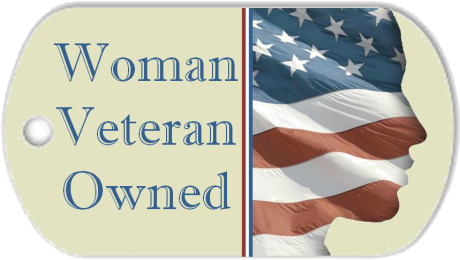
Military training is said to be excellent preparation for a career in business leadership. Veterans bring entrepreneurial qualities like discipline, perspective, leadership ability, and handling pressure under fire as some of the most important skills necessary to run a business. There are currently more than 3 million businesses run by veterans in the United States, with more than 6 million people currently employed by veterans—equating to $210 billion in annual payroll and $1.2 trillion in sales. With more angel investors, small business loan agencies and veteran-assistance programs aimed toward growing veteran businesses, “vetrepreneurship” is now being celebrated as much as those who gave their time and lives fighting for our country. On ‘Dot Complicated with Randi Zuckerberg’ Founder of Women Veterans Alliance, and Navy veteran, Melissa Washington sat down to discuss transitioning from military to civilian employment.
“You miss 100% of the shots you didn’t take.”
“The worst that you can get is a ‘no’.”
“I learned discipline in the Navy. Being resilient. When you join any branch of the armed services you have to adapt to work with others.”
“You can guarantee a person who’s been in the military is always going to be on time.”
“I spent my time on ships so I got to see the world.”
“People who are translating out of the military into the civilian world can be difficult.”
“I transitioned out of the Navy and then 30 days later became a Marine Corps wife.”
“Someone may have been overseas then all of a sudden they’re back at home. If you’ve been gone for 15 years everything’s changed.”
“What is there to help veterans with their transition back into the civilian world.”
“I saw a need in 2009 when I got laid off from corporate America. I started my own business from my living room.”
“In my community there were veteran groups but there were a lot of older male veterans in these groups. There was nothing really for women.”
“I knew a few women and started a little community group of women veterans and we’ve grown from there.”
“We’re seeing an increase of women veterans entrepreneurs out there.”
“We need to share and let the community know where the veteran owned businesses are.”
“I created the WomansVeteranExchange.com as a directory where people can find working women vets.”
“I utilized the Women’s Business Center to look at how to grow the Women’s Veteran Alliance.”
“Bringing in revenue is always something that is tweakable for any business owner.”
“Women vets are underserved. We’re trying to raise the awareness.”
“So many women discount ourselves, we settle too quickly and don’t know how to sell and market ourselves.”
“We had a woman veteran in the Army, when she found the sisterhood of other women veterans she decided to stay where we were.”
“A lot of women don’t identify themselves as veterans. They may not have been in combat or overseas.”
“I tell women who say, ‘I just did 2 or 3 years’ to stop saying that. If you served, you’re a veteran.”
“Women need to make sure they take their veteran benefits.”
“You need a coach to warm you up before you go into an interview. Be prepared, do your research.”
“Look at the total compensation, not just the salary.”
“There are things the military trains people on that others don’t have. We automatically bring certain skills to the table.”
“It’s all about how we brand ourselves and how we market ourselves.”
“When I got laid off I got involved with a job seekers group. I wrote lists of what people needed to do to find work.”
“I wasn’t a writer even though I’m a writer now. But I felt the best way for me to get out there was to write a book.”
“I made sure that each page of my book had something that would apply to finding work.”
“Anybody transitioning into the workforce needs to capitalize on their skills to sell themselves.”
“Moms transitioning back into the workforce need to re-engineer their skill set to sell themselves.”
“The resume is just a piece of paper. People get too hung up on it. They need to get over that hurdle.”
“Having a business card is so powerful. You can become the CEO of your own career that way.”
“If you’re not on LinkedIn, you’re not going to be found. In the workforce, companies look for keywords and credibility.”
“Once you’ve created a LinkedIn profile you’re already a brand.”
“Only 32% of LinkedIn users are there for find jobs. Everyone else is there to network.”
“Have a great, professional looking photo of yourself on LinkedIn. Make sure everything is spelled correctly. Have specific keywords listed.”
“Don’t think of LinkedIn as a resume, think of it as your online brand.”
“You should be googling the companies you’re meeting with just like they are looking up you.”
“Glassdoor’s credibility factor has really risen. They give huge tools to find out a lot about the company you’re working with.”
“There’s the Workforce Tax Credit based upon veteran employees. Anywhere from $3-5,000.”
“I make sure I educate veterans to educate their employers and recruiters to learn about tax credits they can get for hiring veterans.”
“In my city I have my business license and it’s only $1 because I’m a veteran.”
“Uber has incentives for veterans.”
“LinkedIn just introduced ProFinder. You can request for what you’re looking for and people submit proposals. Similar to Fiverr.”
“I started a campaign about what a woman veteran looks like. We’re so unrecognized out there.”
“Everything is so subjective. You can have 5 people look at the same resume and see something different.”
Find out more about Melissa at Melissawashington.com.
Join ‘Dot Complicated with Randi Zuckerberg’ every Wednesday on SiriusXM Business Channel 111 12pm ET!
September 8, 2016
Radio Recap: Personality Researcher Dr. Brian Little

Internationally acclaimed scholar Dr. Brian Little is a personality researcher and psychologist. He’s a Distinguished Research Professor Emeritus at Carleton University and is a former professor at McGill, Oxford, and at my alma mater Harvard, where his course on personality won him the Favorite Professor award continuous years in a row. Known for his boisterous presentations and his widely popular Ted Talk, ‘Confessions of a Passionate Introvert’ and his newest Ted Talk, ‘Who Are You Really? The Puzzle of Personality,’ Dr. Little is also the author of Me, Myself, and Us: The Science of Personality and the Art of Well-Being and I’m happy to have him here with me today.
“Social interaction is all about subtlety.”
“I’m a big fan of technology and the audacious things we’re doing right now.”
“There’s a bit of a danger with robotics, the closer you get to simulating real people, it’s more off-putting.”
“The more we can explore the limits of technology, the better off we are.”
“In 1966, I spent 10 months in library of Oxford to see if there was any evidence of if plastic surgery has changed the personality of a person. I didn’t find any.”
“The British accent is known for enhancing your IQ, until you do something stupid.
“I was torn between humanities and the sciences. Psychology was a wonderful way of looking at neurons and narratives in the same semester.”
“I decided to study psychology because it was such an intoxicated study of how people see themselves.”
“I began to realize I was introverted in adolescence. I knew I was conflict adverse. I was over-stimulated by too much social contact.”
“As a professor, and as a dad, you’re called to act out of character.”
“Our main job is to profess, to convey with passion what you feel to be true. It’s an extroverted performance.”
“Many leaders in business are introverted. But they need to find the capacity to rise to occasions to sell their company.”
“After my lectures, at the break I was so over-stimulated that I needed to get away. Then the students realized that I was off in the men’s room.”
“Just as introverts need to recharge after over-stimulation, extroverts who are asked to adopt a free trait that asks them to act of character, also need a restorative niche.”
“We need to be attune to the various subtleties of our chemistries that make us complex creatures.”
“Enlightened companies are providing niches that will satisfy all aspects of personalities.”
“As we become more and more virtual, the more we are seen to replicate face-to-face communication. We don’t know the effect of this yet.”
“Being godsmacked by the beauty of life is something that occurs that when you turn the corner of street you’ve never been to.”
“We often act of character because of the projects that matter to us in our lives.”
“Men often take it upon themselves to look out for their moms. This is a core project where one can act of character.”
“How do we know what our core projects are? Most people do when they see the possibility of the projects disappearing.”
“Most people have up to 15 core projects in their lives. Kids, work, losing 10 pounds. Some are trivial pursuits, others are magnificent.”
“My own personal hint toward people’s first nature is a vocal tone.”
“Introverts speak quietly. Extroverts speak loudly. The tone and syntax differs.”
“Highly creative people are open to experience, moody, they can be a pain in the neck. They succeed and become transformers.”
“The quiet background people are the ones that make the creative project succeed.”
“In any successful start-up you need to have both dimensions of personality.”
“Meyers Briggs is one of the most popular personality test. My concern is that it might pigeon-hole people.”
“If you see yourself in only constrictive traits then you may follow those traits.”
Join ‘Dot Complicated with Randi Zuckerberg’ every Wednesday at 12pm ET/9am PT only on SiriusXM Business Channel 111

 KOHMAL MINHAS
KOHMAL MINHAS
 KATIE PRENTISS
KATIE PRENTISS
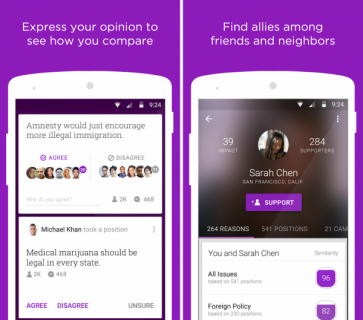
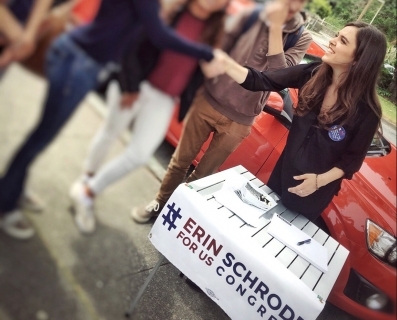 ERIN SCHRODE
ERIN SCHRODE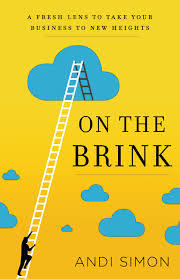 DR. ANDI SIMON
DR. ANDI SIMON
 ANDREA GARFIELD
ANDREA GARFIELD
